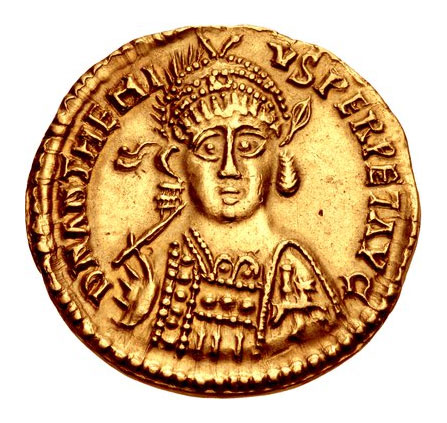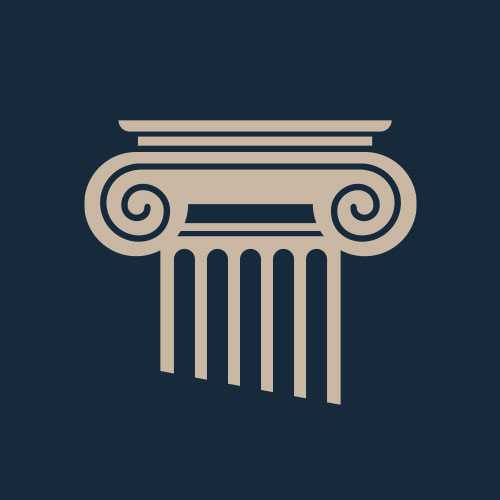Life: AD ? – 472

- Name: Procopius Anthemius
- Born in Galatia.
- Consul AD 455.
- Became emperor in AD 467.
- Wife: Euphemia (a daughter; Alypia).
- Died in March/April AD 472 in Rome.
Early Life
Anthemius was born in Galatia and came from a wealthy, distinguished, and highly influential family in the eastern empire, a recent ancestor of his, Procopius, having been declared Augustus at Constantinople in the brief rebellion against Valen’s rule in AD 365 and his father, also called Procopius, being of patrician rank and having held the post of ‘Master of Soldiers.’ His maternal grandfather Anthemius was praetorian prefect and had acted as regent while Theodosius II was still a child.
Anthemius himself held military command in Thrace in AD 453-4 and became ‘Master of Soldiers’ in 454-67. He also was appointed consul and granted the rank of patrician (patricius) in AD 455. At Marcian’s death, Anthemius was even understood to be the most likely man to succeed him to the throne of the eastern empire, except that Aspar, the powerful ‘Master of Soldiers,’ preferred to see one of his own men on the throne. Hence, the choice fell upon Leo instead.
Anthemius, though, was not the kind of man to hold a grudge against Leo and went on to serve him well, winning military victories for his emperor – first against the Ostrogoths in Illyricum from AD 459-464 and then against the Huns at Serdica (Sofia) in AD 466/7. To further cement the relationship between the two men, Anthemius married Leo’s daughter Euphemia.
Becoming an Emperor
With the Western throne having fallen vacant with the death of Libius Severus in November AD 465 and the Vandals proposing Olybrius as their candidate, Leo now saw it necessary to suggest a candidate of his favoring. If only to prevent a Western ruler with allegiances toward the Vandals. Also, a Vandal raid in AD 467 on the Peloponnese in Greece drove home to Leo just how great the threat posed by these barbarians had become.

With Anthemius having shown such loyal service and being of distinguished descent, he was the ideal candidate. So, in AD 467, Leo nominated Anthemius as the Western emperor. Anthemius, aware of Ricimer’s power in the West, first allied himself with him by marrying his daughter Alypia to him. His arrival in Rome was greeted by the support of the people, the allegiance of the barbarian federates, and the support of the senate.
Uniting Eastern and Western Empires
Anthemius, being a champion of the East, brought about the end of the hostilities between the Eastern and Western empires. Both empires soon after embarked on another giant effort to overcome the Vandals. A massive fleet was assembled to carry the troops to their destinations. But the commanders were badly chosen. Basiliscus, who commanded the Eastern fleet, was notoriously unreliable. Meanwhile, the choice of Marcellinus as the commander of the Western fleet no doubt angered Ricimer, as he was Ricimer’s foremost enemy.
Marcellinus successfully attacked Sardinia and landed troops in Tripolitania. But Basiliscus led the Eastern fleet into disaster against Geiseric off Carthage. Most of the fleet was sunk – its remainder fleeing to Sicily with Basiliscus and Marcellinus. There, Marcellinus was killed, more than likely as a result of a plot by Ricimer.
Then, in Gaul, a new threat arose as Euric murdered his brother, Theodoric II, took over the rule of the Visigoths, and set out in an attempt to bring the entire Gaul under his control. Anthemius’ attempt to put a stop to Euric’s ambitions ended in a crushing defeat in a battle on the western bank of the river Rhône, in which the emperor’s son Anthemiolus and three leading Roman generals lost their lives.

Anthemius and Ricimer Conflict
After this setback, relations between Anthemius and Ricimer deteriorated sharply. Ricimer obviously wanted to rid himself of yet another unsuccessful emperor, and Anthemius well knew that Ricimer’s past record proved that an emperor had good reason to be suspicious of Ricimer. So bad did relations between the emperor and his ‘Master of Soldiers’ grow that Italy was virtually divided in two – Ricimer ruling his part from Mediolanum (Milan) and Anthemius ruling his from Rome.
In AD 470, the bishop of Ticinum (Pavia) managed to reconcile them, but the peace was not to last for long. Already, by AD 472, Ricimer marched south at the head of his army to depose Anthemius and, in his place, put Olybrius, the candidate favored by the Vandals.
Death of Emperor Anthemius
Backed up by a Visigoth force, Anthemius held out against the siege for three months until, eventually, Ricimer’s troops managed to force their way across the Pons Aelius (Ponte Sant’Angelo) and into Rome. Anthemius disguised himself as a beggar in an attempt to flee. But he was betrayed, and by order of Ricimer’s nephew, Gundobad, Anthemius was beheaded in March or April AD 472.
People Also Ask:
Was Anthemius a pagan?
Anthemius, one of the last Roman emperors of the West who ruled from 467 to 472, surrounded himself with prominent pagans such as Messius Phoebus Severus and was believed to hold pagan views.
Who made paganism illegal?
For example, in 341, Constantine’s son Constantius II enacted legislation forbidding pagan sacrifices in Roman Italy. In 356, he issued two more laws forbidding sacrifice and the worship of images, making them capital crimes, as well as ordering the closing of all temples.
How was Byzantine different from Rome?
The Roman Empire practiced paganism, worshipping a pantheon of gods, while the Byzantine Empire embraced Christianity early on. The Western Roman Empire primarily spoke Latin, while the Byzantine Empire was Greek, both culturally and linguistically. The Roman Empire covered a larger area than the Byzantine Empire.
Who was the greatest Roman emperor?
Unsurprisingly, the title of the “first greatest Roman emperor” goes to Caesar Augustus. While in his youth, Octavian plunged Rome into one of the bloodiest civil wars and toppled the Roman Republic; as emperor Augustus, he created the strong foundation for one of the truly greatest of all empires in human history.

Historian Franco Cavazzi dedicated hundreds of hours of his life to creating this website, roman-empire.net as a trove of educational material on this fascinating period of history. His work has been cited in a number of textbooks on the Roman Empire and mentioned on numerous publications such as the New York Times, PBS, The Guardian, and many more.
